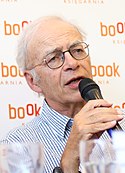Peter Singer Quote
When we use animals to convert crops into meat, eggs, or milk, the animals use most of the food value to keep warm and develop bones and other parts we can’t eat. Most of the food value of the crops we have grown is wasted—in the case of cattle, we get back only 1 pound of beef for every 13 pounds of grain we feed them. With pigs the ratio is 6 pounds of grain to 1 pound of pork. And even these figures underestimate the waste, because meat has a higher water content than grain.30 The world is not running out of food. The problem is that we—the relatively affluent—have found a way to consume four or five times as much food as would be possible, if we were to eat the crops we grow directly.
Peter Singer
When we use animals to convert crops into meat, eggs, or milk, the animals use most of the food value to keep warm and develop bones and other parts we can’t eat. Most of the food value of the crops we have grown is wasted—in the case of cattle, we get back only 1 pound of beef for every 13 pounds of grain we feed them. With pigs the ratio is 6 pounds of grain to 1 pound of pork. And even these figures underestimate the waste, because meat has a higher water content than grain.30 The world is not running out of food. The problem is that we—the relatively affluent—have found a way to consume four or five times as much food as would be possible, if we were to eat the crops we grow directly.
Related Quotes
Certainly we can say that the pace of modern life, increased and supported by our technology in general and our personal electronics in particular, has resulted in a short attention span and an addict...
Arthur Rosenfeld
Tags:
being, complicated, critical thinking, daoism, emotion, feeling, hectic, life, meditation, modern life
About Peter Singer
Peter Albert David Singer (born 6 July 1946) is an Australian moral philosopher who is Emeritus Ira W. DeCamp Professor of Bioethics at Princeton University. Singer's work specialises in applied ethics, approaching the subject from a secular, utilitarian perspective. He wrote the book Animal Liberation (1975), in which he argues for vegetarianism, and the essay "Famine, Affluence, and Morality", which argues the moral imperative of donating to help the poor around the world. For most of his career, he was a preference utilitarian. He revealed in The Point of View of the Universe (2014), coauthored with Katarzyna de Lazari-Radek, that he had become a hedonistic utilitarian.
On two occasions, Singer served as chair of the philosophy department at Monash University, where he founded its Centre for Human Bioethics. In 1996, he stood unsuccessfully as a Greens candidate for the Australian Senate. In 2004, Singer was recognised as the Australian Humanist of the Year by the Council of Australian Humanist Societies. In 2005, The Sydney Morning Herald placed him among Australia's ten most influential public intellectuals. Singer is a cofounder of Animals Australia and the founder of the non-profit organization The Life You Can Save.
On two occasions, Singer served as chair of the philosophy department at Monash University, where he founded its Centre for Human Bioethics. In 1996, he stood unsuccessfully as a Greens candidate for the Australian Senate. In 2004, Singer was recognised as the Australian Humanist of the Year by the Council of Australian Humanist Societies. In 2005, The Sydney Morning Herald placed him among Australia's ten most influential public intellectuals. Singer is a cofounder of Animals Australia and the founder of the non-profit organization The Life You Can Save.
